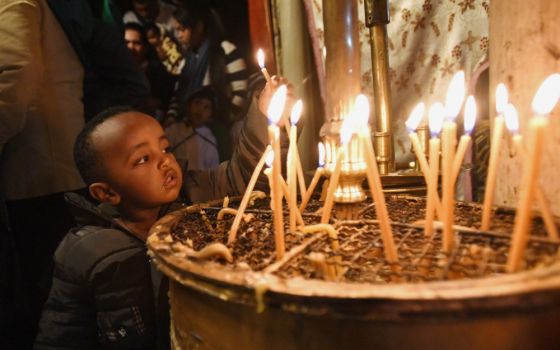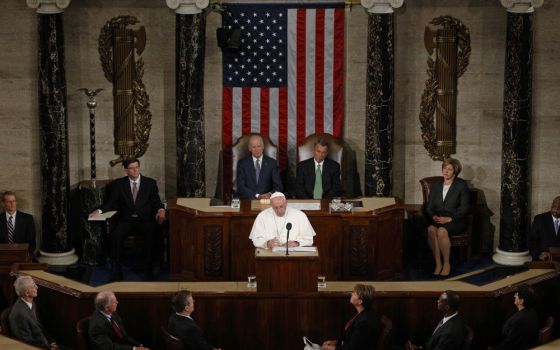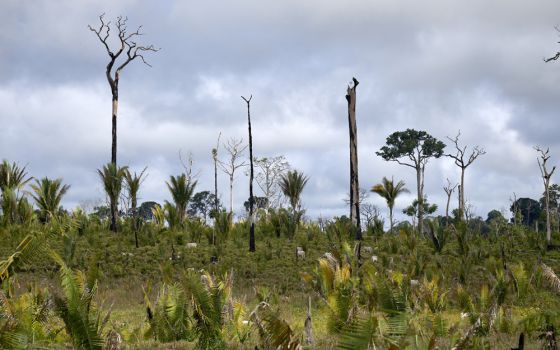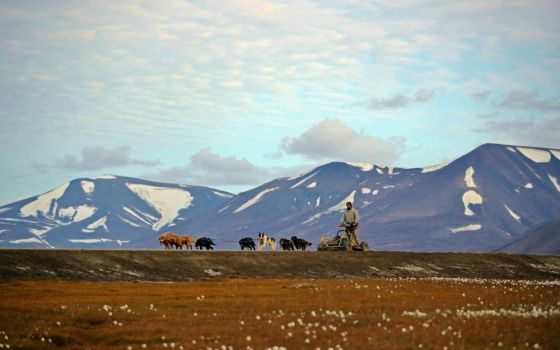
Pope Francis addresses a joint meeting of Congress in Washington Sept. 24, 2015. Also pictured are Vice President Joe Biden and House Speaker John Boehner, both of whom are Catholic. (CNS/Paul Haring)
Editor's note: NCR is sharing Advent reflections based on "Laudato Si': on Care for our Common Home," by former NCR editor and publisher Arthur Jones. These were originally published in 2015 by St. Vincent de Paul Parish Community in Baltimore. He wishes to acknowledge the inspiration of the Celtic invocations of Alexander Carmichael's Carmina Gadelica. We'll publish his reflections for Weeks 3 and 4 on Dec. 15 and 22. You'll find an introduction to the series here, the first installment here and the second one here.
U.S. Catholicism has produced iconic photographs showing people demonstrating for what they believe, from Cesar Chavez and the United Farm Workers to the Plowshares anti-nuclear stalwarts.
We have enough imagination and sufficient reality pixels stored in the recesses of our brains to conjure up for ourselves three other images:
- The elderly Dorothy Day, during a protest, seated at the edge of the curb, armed soldiers towering over her.
- Then, a photograph none of us has seen, but all of us can imagine: Sr. Dorothy Stang, a Sister of Notre Dame de Namur, facing off against ranchers in the Amazonian rainforest. She was protesting against the seizure of the indigenous people's land, of the despoliation of the rainforest and its valuable biodiversity, and for her protests she was murdered.
- And finally, the 5-foot-9-inch Pope Francis, a lone figure in white, smiling, standing before Congress, before the American people, before the world, telling them — telling us — in the politest possible way we have our priorities screwed up; boldly urging the wealthy and the powerful to radically change their ways; candidly accusing the powerful, the greedy, those bent on wealth and maximizing profits at any cost, that they are not just wrong, but anti the common good, despoiling the Earth, and further damaging the already poor.
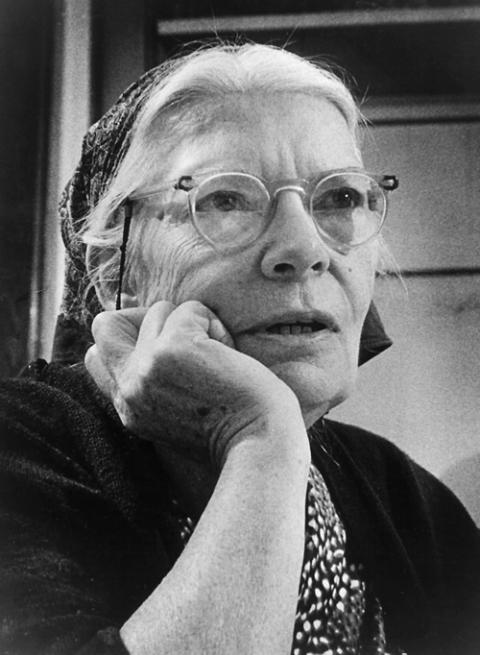
Dorothy Day (CNS/Courtesy of Milwaukee Journal)
All took their stands knowing that vast segments of the society against which they faced off scorned, pitied, ridiculed and dismissed them — and their statements and arguments — as simple-minded and out of touch with the real world.
But all represent the real world.
That's the point the pope is trying to make.
O God, let me cultivate ecological virtues.
Sunday, Dec. 15: Lust for profit and personal gain
Pope Francis is addressing the entire world, yet he is well aware, as are we, that the United States is a major part of the problem. He knows, too, as do we, that unbridled capitalism (much of it U.S.-based, U.S.-originated and U.S.-controlled) is an even larger part of the problem.
What does that actually mean and actually do to us?
In his 2015 The Age of Acquiescence: The Life and Death of American Resistance to Organized Wealth and Power, Steve Fraser provides us with a Made-in-America example of the mindset Pope Francis has set his cap against globally.
Fraser writes that "the conspicuous consumption of the nouveau plutocracy inevitably earned the era a reputation as the country's second Gilded Age. The parallels were obvious. There was the same insatiable lust [as the first Gilded Age] for excess … vulgarity."
The author describes how wealth distribution inequality and income inequality "increased at a speed never before seen in American history." The rest we know: "While ten million lost their jobs to plant closings and layoffs" as American manufacturing was sent overseas and factories and cities turned to dust, CEOs' earnings "ballooned 500 to 700 percent."
Francis is telling us these insatiable lusts are at the root of the Earth's and humanity's pending disasters; that it is the lust for profit and personal gain, material goods and conveniences that have produced conditions that mean "doomsday predictions can no longer be met with irony or disdain."
"We may well be leaving to coming generations debris, desolation and filth," the pope again warns. "The pace of consumption, waste and environmental change has so stretched the planet's capacity that our contemporary lifestyle, unsustainable as it is, can only precipitate catastrophes," catastrophes we're already witnessing "in different areas of the world."
O God, let me cultivate ecological virtues.
Monday, Dec. 16: New Davids and Goliaths
Pope Francis is asking us to stand and confront. If he is David in white, up against the Goliaths in $2,000 suits, against global priorities set by powerful groups and government, he asks us to be David in groups and coalitions and ministries and communities, up against the same adversaries, but — and this is hard — but maybe, up against, too, people next door, perhaps people in the next room. At this point we can almost hear Jesus talking about issues that set brother against brother, sons against fathers. Consequently, if we are to speak firmly, it must be in a gentle, a most Christian, way.
This is the tone as well as the basis for Francis' anticipated "dialogues," as in "Dialogue on the Environment in the International Community," "Dialogue for New National and Local Policies," "Dialogue and Transparency in Decision-Making," "Politics and Economy in Dialogue for Human Fulfillment," and "Religions in Dialogue with Science." The dialogues lead back into his thoughts regarding "Ecological Education and Spirituality."
It is to educate us, and embolden us in our spiritual questing, that gives the pope the impetus to push us as hard as he is.
He says, "a global consensus is essential for confronting the deeper problems, which cannot be resolved by unilateral actions. … We know that technology based on the use of highly polluting fossil fuels — especially coal, but also oil and, to a lesser degree, gas — needs to be progressively replaced without delay."
The pope says that this period we are living through "may well be remembered as one of the most irresponsible in history."
Francis does not mince words. He warns that gains in protecting biodiversity have been regrettably few, for countries place their national interest above the global common good.
Then he starkly tells us: "Reducing greenhouse gases requires honesty, courage and responsibility" and while powerful countries have to be the most courageous, ordinary individuals cannot opt out of being involved in such change.
O God, there seems to be no end to what must be undertaken. But I do know that Pope Francis knows that these oppositional mindsets that stand in the way of confronting ecological problems are the same mindset that "also stands in the way of achieving the goal of eliminating poverty." Let me take heart, and calmly see what I might do — knowing I can't do everything.
O God, let me cultivate ecological virtues.
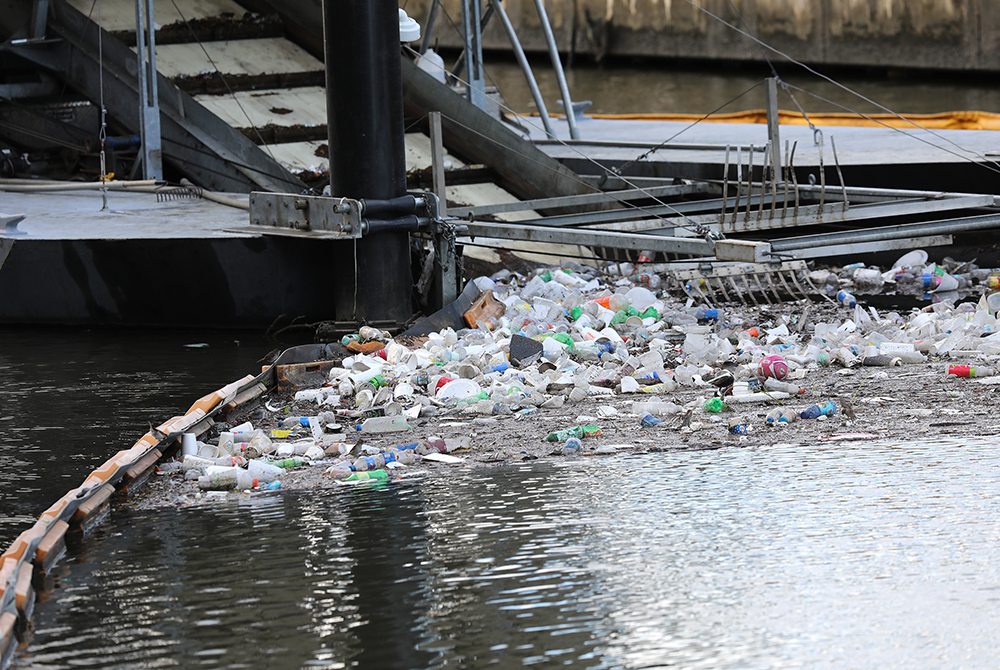
Trash floats in a containment area in Baltimore's Inner Harbor June 11. (CNS/Bob Roller)
Tuesday, Dec. 17: A new dialogue
The pope wants "politics and economy in dialogue for human fulfillment." We only have to look at our own national politics, and the many-viewed approaches to our own — comfortable by world standards — economic life to realize how hard creating that dialogue will be.
It is made harder by our knowing that integral ecology demands that we keep before not only Jesus' answer to "who is my neighbor?" but Pope Francis' answer to "what is my neighbor?"
"Today," the pope continues, "in view of the common good, there is urgent need for politics and economics to enter into a frank dialogue in the service of life."
Just looking at the state of the common good dialogue in our own nation, this seems like a pious hope. Not to Francis, he is holding before him banners that wave images of disaster. He has been to his own mountaintop and this is what he has seen. On he goes:
Saving (the) banks at any cost, making the public pay the price, foregoing a firm commitment to reviewing and reforming the entire system, only reaffirms the absolute power of a financial system, a power which has no future and will only give rise to new crises. … [The response to the 2007-2008 financial crisis] did not include rethinking the outdated criteria which continue to rule the world. …
It should always be kept in mind that "environmental protection cannot be assured solely on the basis of financial calculations of costs and benefits" [referencing the Compendium of the Social Doctrine of the Church]. … We need to reject a magical conception of the market, which would suggest that problems can be solved simply by an increase in the profits of companies or individuals.
We are to reject the Western world's, the developed world's "magical conceptions." Reject them especially when those who oppose these magical concepts are accused of 'irrationally' standing in the way of progress. Dear God, this is an awful lot to take in, knowing how our country and our world operate. Where do we find an opening? Where do I go, what do I do to stand with Pope Francis?
O God, let me cultivate ecological virtues.
Dear God, this is an awful lot to take in, knowing how our country and our world operate. Where do we find an opening? Where do I go, what do I do to stand with Pope Francis?
Wednesday, Dec. 18: Outside the cocoon
The pope is unrelenting as he plows ahead:
- "The principle of the maximization of profits, frequently isolated from other considerations, reflects a misunderstanding of the very concept of economy."
- "Politics and the economy tend to blame each other when it comes to poverty and environmental degradation."
- And as we strive with Francis "towards a new lifestyle," we find ourselves accepting his statement that as "the market tends to promote extreme consumerism in an effort to sell its products, people can easily get caught up in a whirlwind of needless buying and spending."
- Our own heads are nodding in agreement as the pope continues: "An awareness of the gravity of today's cultural and ecological crisis must be translated into new habits. ... Ecological education can take place in a variety of settings: at school, in families, in the media, in catechesis and elsewhere. Good education plants seeds when we are young. … I would stress the great importance of the family."
- "Political institutions and various other social groups are also entrusted with helping to raise people's awareness. So too is the Church. All Christian communities have an important economic role to play in ecological education."
The pope, in a most telling section, then calls for an "ecological conversion."
We are not Christians mocked for our stances, and certainly not persecuted. Is Francis asking why our families and our faith communities are not in the public view, standing firm and tall for an integral ecology? Is it that attempting to live simply by simply living in our cocoons, we have forgotten that we must dare to go outside our cocoon to be seen and heard?
O God, let me cultivate ecological virtues.
Advertisement
Thursday Dec. 19: Integral ecology
Jesus preached the good news and presented to us the task, the chance, and the necessity of being the good news. We are to act for a suffering Mother Earth and the desperate, materially poor.
We ask God to help us lift up the threatened environment and the desperate poor in every encounter; the tremendous challenge of being a 21st century Christian means we lift up the poor and protect the environment as a mark of our humanity.
What Francis has done is said that while we may instinctively feel these things, he has insisted we must take steps to understand them.
How do we do it? Perhaps as our ecologically-attuned Christian forebearers did when they related to stranger, environment and cosmos. We can gain strength where they gained strength. In prayer. So we join hands with them in their rural calm, once more with our Celtic Christians for a little spiritual respite in this prayer collected by Alexander Carmichael:
God with me lying down,
God with me rising up,
God with me in each ray of light,
Nor I a ray of joy without Him,
Nor one ray without Him.Christ with me sleeping,
Christ with me waking,
Christ with me watching,
Every day and night,
Each day and night.God with me protecting,
The Lord with me directing,
The spirit with me strengthening,
For ever and for evermore,
Ever and evermore, Amen.
Chief of chiefs, Amen.
O God, let me cultivate ecological virtues.
Friday, Dec. 20: Countercultural
The pope is at times forceful, at times gentle, leading us, prodding, guiding. He has asked us in several different ways to take on the world's skewed economic priorities.
We need to stand with him because we are well aware that no area of this encyclical is more likely to have the pope's words more quickly dismissed than when he stands firm against the selfish, heedless and heartless economic ways of the power wielders.
The power wielders' immediate charge was, and always will be, that Pope Francis does not know what he's talking about — and anyway he should stick to religion and stay out of things that don't concern him. (Even Catholic politicians seeking the presidency have said they don't take their economic guidance from the pope.) By the end of our third week of reflections with the pope, we are well aware and accept that indeed Pope Francis knows precisely what he is talking about.
O God, let me cultivate ecological virtues.
Saturday, Dec. 21: Very countercultural
His words are countercultural, that is, counter to the developed world's economic profits-at-any price culture, so, counter to the global economic concentrations (think rich nations and free trade zones) of the world, both corporate and economic.
It was once pointed out to a wealthy industrialist in Manchester, England, that there was a great deal of poverty and deprivation in the city. The industrialist replied, "And yet, sir, there is a great deal of money to be made here. Good day to you."
The language may have changed, but the same sentiments prevail. We must pause and ask ourselves again, "Does anything I do contribute to poverty and deprivation, including depriving the Earth and all life on Earth of sustenance?"
Touch the hearts
of those who look only for gain
at the expense of the poor and the Earth.
O God, let me cultivate ecological virtues.
[Arthur Jones is a former editor and publisher of NCR.]



